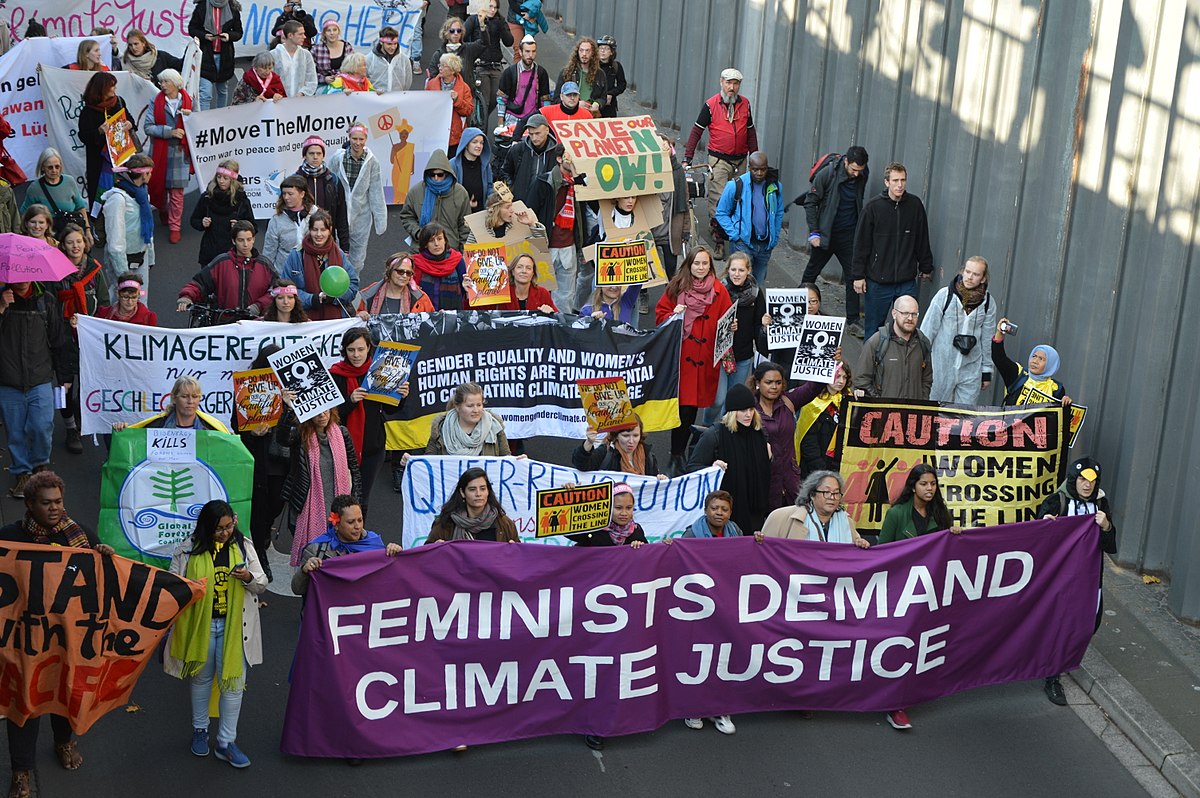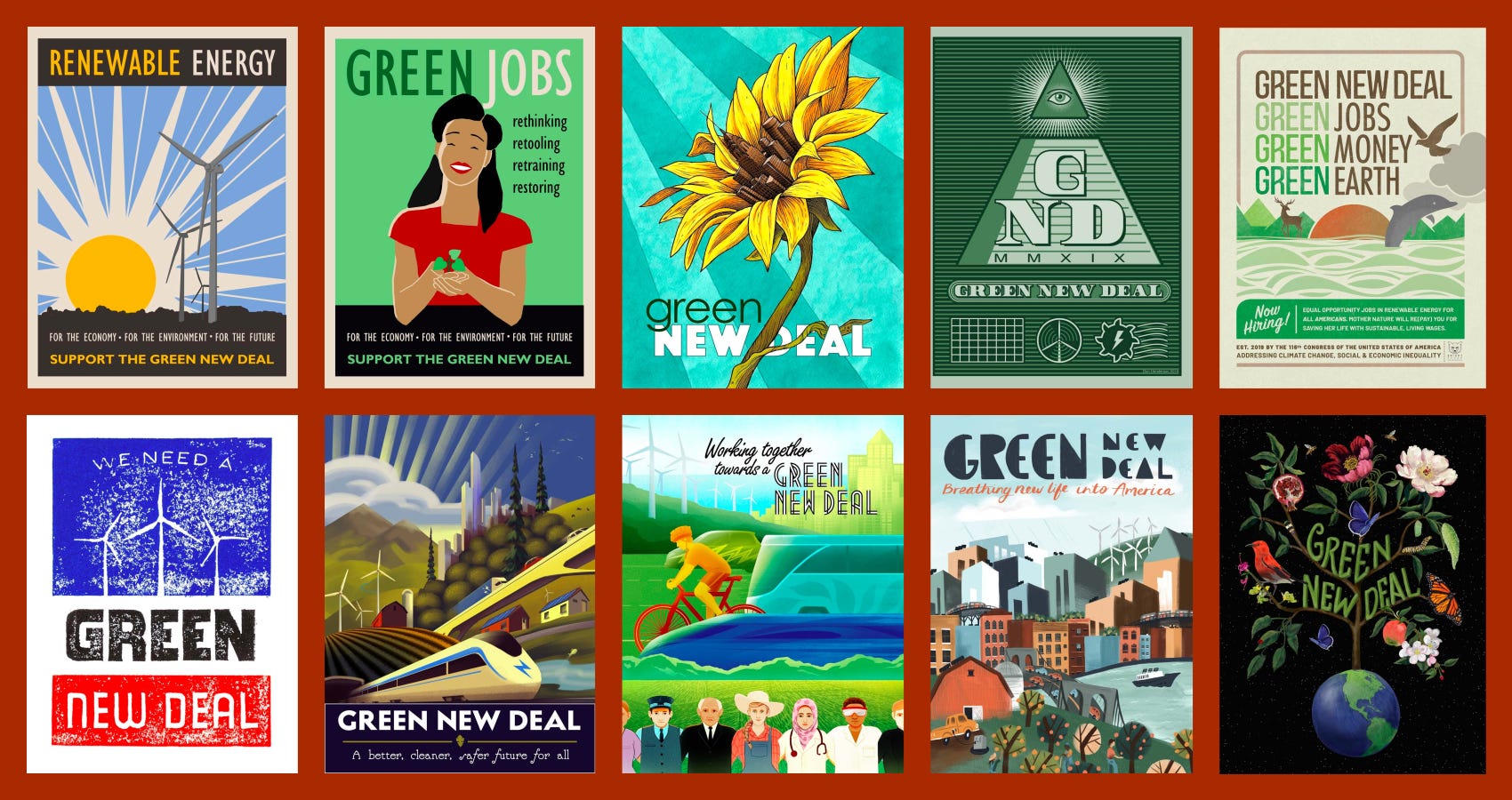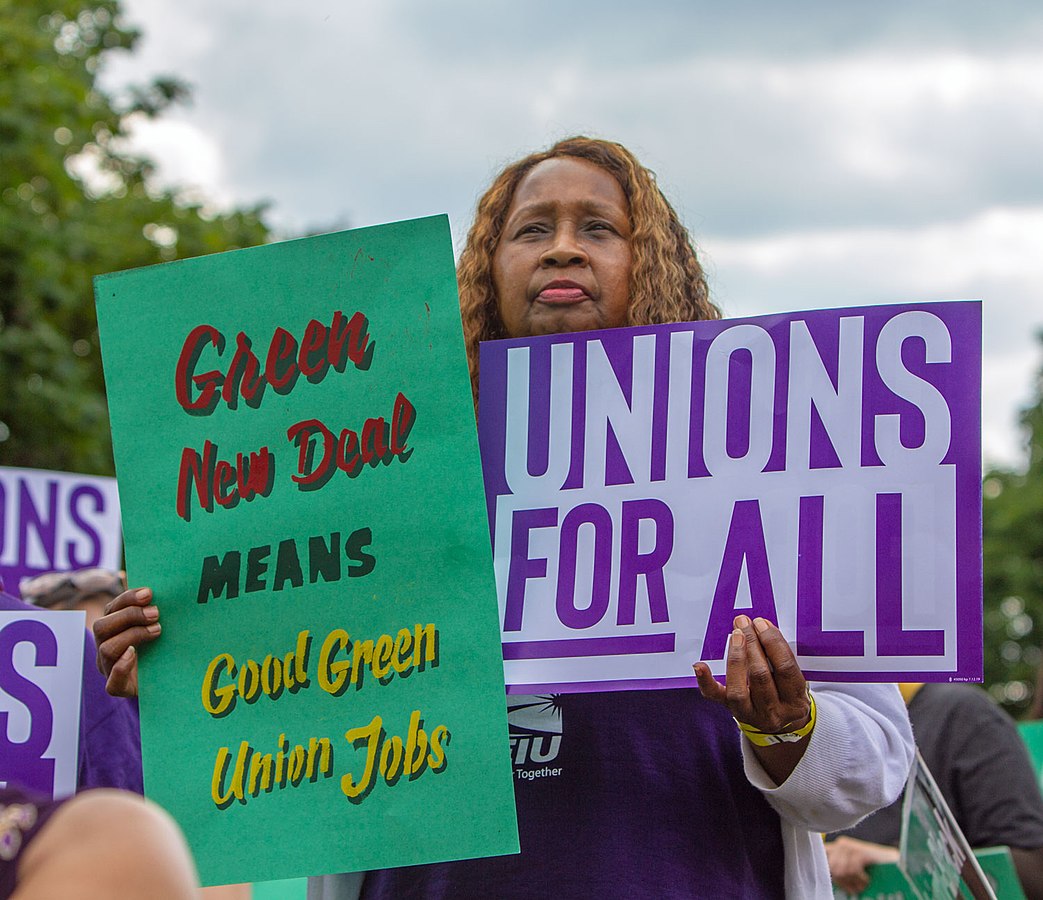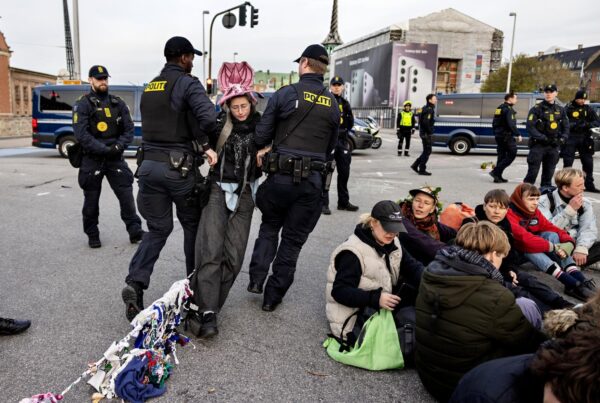By Gustavo García López and Diego Andreucci / Undisciplined Environments
The Green New Deal has become a central focus of debates around ecosocialist politics; this list brings together diverse resources to foster critical reflection on its potential and limitations.
The global socioeconomic and climate crises have been accompanied by an expansion of social movements and public debates and proposals for transforming our societies towards just and ecologically sustainable futures. Increasingly, these proposals are coalescing under the banner of a Green New Deal (GND).
The GND concept began circulating in the wake of the 2007-2008 global financial crisis and related discussions about governments’ recovery plans. It seems to have been coined in a 2007 article by economist Thomas Friedman, who called for a government plan which would seed basic research to incentivize corporate ‘green’ innovations. Then-presidential candidate Barack Obama adopted the ideas as part of his campaign with promises of a “green” recovery – one which never really materialized. The US Green Party also made it a focus of its presidential campaign in 2012.
In the UK, the New Economics Foundation published a report in 2008 focused on solving what they described as a “triple crunch” of the credit crisis, climate change and high oil prices. The European Greens published and campaigned around a similar report in 2009, focused on public and private investment for “green modernization” or ‘eco-industries’ in the recovery process, in transport and renewable energies, as well as the worldwide transfer of these technologies. At the international level, the United Nations Environmental Program published a report at the time calling for a “Global Green New Deal”.
Over the last two years, the GND concept has garnered great attention in the political debate in the United States, the United Kingdom, and the European Union. It has also started to be discussed as a strategy from and for the Global South, with analyses from Africa and Latin America, as well as proposals for a global GND. The history of the GND shows the variegated ideological underpinnings which persist to this day. The term is still being partially embraced by neoliberal and liberal neo-Keynesian forces, as seen in the European Union’s call for a European “Green Deal”, focused on a supposedly “green growth”. From this perspective, any techno-“green” or renewable energy initiative could be called a Green New Deal. As noted recently by a journalist, everyone seems to want a seat in the GND bandwagon these days. This risks making it another empty term, like sustainability.
Yet today’s version of the GND comes in a very different context than the original use and has become symbolically associated mainly with left ecosocialist politics, partly related with the growth of Democratic Socialist and radical left tendencies within and outside the US Democratic Party, as well as increasing discussions about the global crisis of inequality and socio-environmental injustices. Radical versions of the GND put forth a more comprehensive strategic vision and programmatic proposal to transition to a carbon-free economy that avoids climate catastrophe, and in turn addresses the economic and inequality crisis.
This entails an energy transition towards a 100% renewable system, along with a guarantee of employment with living wages, other measures to strengthen labor rights, and policies to guarantee social justice towards the working class and historically marginalized communities. Other policies that are being discussed include a universal basic income, a progressive tax reform, suspension of payments or abolition of the external debt, and a national care system. At the international level, the GND is being proposed as a measure of mitigation of the climate debt that rich countries have with the countries of the global South, and addressing the persistence of stark North-South inequalities.
A crucial difference today is the influence on GND debates from climate movements that have burst into the scene with force over the last five years or so, and which come from decades of building grassroots local and transnational power. This new moment was epitomized by the US-based Sunrise Movement (re)coining the GND in its occupation of the office of Democratic House representative Nancy Pelosi to demand swift climate action in 2018, a demand taken up by Democratic Socialist representative Alexandria Ocasio-Cortez. The Climate Justice Alliance – composed of more than 70 grassroots organizations – deepened the discussions by linking the GND with longer-standing proposals for climate justice and just transitions, and emphasizing that a GND should be led by frontline communities and workers most impacted by climate change, who have been leading climate justice struggles and solutions.
Such a radical turn is accompanied by a lively debate about the limits and potentials of GND to transcend capitalism, its growth imperative and its crises, and about which actors should lead this transition. Crucial issues, like the need for “socialising” means of production and reproduction, such as energy, land or housing – which had been pushed to the margin by three decades of neoliberalism – have been again brought to the centre of the political debate (no less than in the US, the belly of the capitalist beast).
Some commentators on the Left remain skeptical, pointing to the intrinsic limitations of the concept, asking important critical questions about whether the GND is ultimately capable of overcoming the “coloniality” and problematic socio-ecological implications of capitalist development. Yet, scholars and activists from different movements are appropriating the concept and making their own variants of it, including an ecological-economic and degrowth GND, a people-led and frontline communities’ GND, a feminist GND, an indigenous (‘Red’) Deal, or an Ecosocial Pact (Pacto Ecosocial del Sur, as it has been labelled in Latin America).
In this moment of struggle over the meaning of the GND as a “master signifier” of eco-socialist politics, we want to offer this reading list as a way of providing an introduction to this diversity of positions and stimulating further debate. The list is structured by type of resource (books, academic journals, blogs and magazines, reports and briefs, audiovisual resources and movement campaigns), with the exception of sources in Spanish, which are grouped in one section following this introduction.
The Annex at the bottom collects additional materials that are not directly on the GND, but offer relevant research and reflections on related themes of Just Transition(s), and energy and sustainability transitions. This is a relatively small sample of sources out of the hundreds we collected and received from friends and colleagues (see the “acknowledgements” at the end of this post), selected mainly on the basis of their relevance to political ecology debates. We hope you find it useful in your political-ecological praxis.

Sunrise Movement poster for their Road to the Green New Deal tour. Source: sunrisemovement.org.
Recursos en Español (in Spanish)
Atienza, Jara (2019). Jeremy Rifkin: Un Green New Deal Global para salvar al mundo. Ethic, 18 de diciembre.
Bertinat, Pablo (2016) Transición energética justa: pensando la democratización energética. Montevideo, Friedrich Ebert Stiftung Uruguay.
Honty, Gerardo y Eduardo Gudynas (2014) Cambio Climático y Transiciones al Buen Vivir: Alternativas al desarrollo para un clima seguro. Lima, Red Peruana por una Globalización con Equidad.
Movement Generation (2016) De los Tanques y Bancos a la Cooperación y el Cuidado: Un Marco Estratégico para la Transición Justa.
Mediavilla, Margarita. (2020). No saldremos de esta crisis con un New Green Deal. El Salto Diario, 30 de abril.
Pollin, Robert (2018) Decrecimiento vs. Nuevo New Deal Verde. New Left Review, 112, 5-25.
Rodríguez, Emmanuel (2019) ¿Un Green New Deal para España?, Ctxt: Contexto y Acción, N. 242, 9 de octubre.
Svampa, Maristella and Enrique Viale (2020) “Nuestro Green New Deal”, Revista Anfibia.
Tena, Alejandro (2019). Green New Deal vs. Decrecentismo. Público, 23 de octubre.
Tejero, Héctor y Emilio Santiago (2019) ¿Qué hacer en caso de incendio? Manifiesto por el Green New Deal. Madrid, Capitán Swing.
Tornel, Carlos (Coord.) (2019) Alternativas para limitar el calentamiento global en 1.5°C. Más allá de la economía verde. Ciudada de México, Heinrich Böll Stiftung México y el Caribe.
Campaña por un Pacto Ecosocial del Sur (página web).
CENSAT Agua Viva: Transiciones.info (página web)
CLACSO: “Por un pacto Social, Ecológico, Económico e Intercultural para América Latina” (webinar). Lanzamiento del Pacto Ecosocial del Sur, 24 de junio 2020.
Fundación Rosa Luxemburgo – Oficina Región Andina: Pacto del Sur – Pacto del Norte? Diálogo entre el “Pacto Ecosocial del Sur” y el “Green New Deal”, 8 de julio 2020.
Books (monographs and edited collections)
Aronoff, Kate, Alyssa Battistoni, Daniel Aldana Cohen, and Thea Riofranco (2019). A Planet to Win: Why we need a Green New Deal. London, Verso.
Cox, Stan (2020) The Green New Deal and Beyond: Ending the Climate Emergency While We Still Can. San Franscisco, City Light Publishers.
Klein, Naomi (2019) On Fire: The Burning case for a Green New Deal. New York, Simon & Schuster (extract in The Guardian).
Pettifor, Anne (2019) The case for the Green New Deal. London, Verso.
Articles in academic journals
Galvin, R., & Healy, N. (2020). The Green New Deal in the United States: What it is and how to pay for it. Energy Research & Social Science, 67, 101529.
Goh, Kian (2020) Planning the Green New Deal: Climate Justice and the Politics of Sites and Scales, Journal of the American Planning Association, in press.
Jacobson, M. Z., Delucchi, M. A., Cameron, M. A., et al. (2019). Impacts of Green New Deal energy plans on grid stability, costs, jobs, health, and climate in 143 countries. One Earth, 1(4), 449–463.
Patel, Raj, and Jim Goodman (2020). The Long New Deal. The Journal of Peasant Studies, 47(3), 431-463.
Pollin, R. (2018). De-Growth vs a Green New Deal. New Left Review, 112, 5-25.
Stoner, A. M. (2020). Critical Reflections on America’s Green New Deal: Capital, Labor, and the Dynamics of Contemporary Social Change. Capitalism Nature Socialism (online).
Tarus, L., Hufford, M., & Taylor, B. (2017). A Green New Deal for Appalachia: Economic transition, coal reclamation costs, bottom-up policymaking (Part 2). Journal of Appalachian Studies, 23(2), 151-169.
Taylor, B., Hufford, M., & Bilbrey, K. (2017). A Green New Deal for Appalachia: Economic transition, coal reclamation costs, bottom-up policymaking (Part 1). Journal of Appalachian Studies, 23(1), 8-28.
White, D. (2020). Just transitions/design for transitions: Preliminary notes on a design politics for a Green New Deal. Capitalism Nature Socialism, 31(2), 20-39.
Magazine and Blog Special Series/Issues
In These Times, Special Issue on “Getting to Zero Carbon” (edited by Winona LaDuke, May 2019):
- Aronoff, Kate (2019) How To Bury the Fossil Fuel Industry.
- Alperovitz, Gar, and Johanna Bozuwa (2019) Electric Companies Won’t Go Green Unless the Public Takes Control.
- Brecher, Jeremy (2019) Making the Green New Deal Work for Workers.
- Holt-Gimenez, Eric (2019) We Produce Too Much Food. The Green New Deal Can Stop This.
- Akuno, Kali (2019) The Green New Deal Must Have a Zero Waste Policy.
Jacobin, ongoing series on the GND:
- Aldana Cohen, Daniel (2019) We Need a Green New Deal for Housing, June 4.
- Battistoni, Alyssa and Thea Riofrancos (2019) Bernie Sanders’s Green New Deal Is a Climate Plan for the Many, Not the Few, August 23.
- Bhattachary, Tithi (2019) Three Ways a Green New Deal Can Promote Life Over Capital, June 10.
- Bozuwa, Johanna and Thomas M. Hanna Democratize Finance, Euthanize the Fossil Fuel Industry, March 7.
- Patel, Raj and Jim Goodman (2019) “A Green New Deal for Agriculture”, April 4.
- Svampa, Maristella and Enrique Viale (2020) A View of the Green New Deal From Argentina, June 17.
NACLA Report on the Americas, Special Issue “A Green New Deal for the Americas: Mobilizing for Climate Justice from Above and Below” (edited by Daniel Aldana Cohen and Thea Rionfrancos, 2020):
- Aldana Cohen, Daniel and Thea Rionfrancos (2020) Latin America’s Green New Deal.
- Baker, Shalanda (2020) Fighting for a Just Transition.
- Santiago, Ruth, Catalina M. de Onís and Hilda Lloréns (2020) Powering Life in Puerto Rico.
- Perreault, Tom (2020) Bolivia’s high-stakes lithium gamble.
- Klinger, Julie Michelle (2020) Groundbreaking, without Breaking New Ground.
- Gamble, Julie (2020) A Transit Manifesto for Quito.
- Meek, David and Rebecca Tarlau (2020) Educating for Ecosocialism.
Public Administration Review, Bully Pulpit Symposium The Green New Deal: Pathways to a Low Carbon Economy (edited Nives Dolsak and Aseem Prakash, July 16, 2019)
- Dolsak, Nives and Aseem Prakash (2019) Policy Translation of the Green New Deal: An Introduction to the Symposium.
- Barbier, Eduard B. (2019) The Fall and Rise of the Green New Deal.
- Ardar, Angela, Olivia Burlingame, Anthony Rogers-White and Fernando Tormos-Aponte (2019) Green New Deal Policies Should Be Fueled by Frontline and Grassroots Power.
The Conversation, section on the Green New Deal:
- Blumsack, Seth (2019) The Green New Deal’s 10-year timeframe is unrealistic even if a lot can happen in a few decades, February 21.
- Tienhaara, Kyla (2019) Green New Deal critics can’t see the forest for the trees, February 28.
- Hornborg, Alf (2019) A globalised solar-powered future is wholly unrealistic – and our economy is the reason why, September 6.
- Jacobs, Micheal (2019) Labour’s Green New Deal is among the most radical in the world – but can it be done by 2030?, September 25.
The Shoestring, Imagining a Just Transition in Western Mass (5-part essay by Sarah Field, September 2019).
Uneven Earth, blog GND Series (edited by Leah Temper and Sam Bliss, 2019)
- Temper, Leah and Sam Bliss (2019) A GND for an ecological economy, October 24.
- Keady, Water (2019) Shrink the military, shrink injustice, October 30.
- Gabriel Yahya Haage (2019) Rethinking education for the Green New Deal, November 6.
- Morgan, Caitlin Bradley (2019) A just food transition, December 11.
- Ament, Joel (2020) Public money for environmental justice, January 7.
- Crownshaw, Tim (2020) Energy and the Green New Deal, January 28.
- Garver, Geoff (2020) Who owns the Green New Deal?, February 4.

COP23 demonstration in Bonn, Germany (2017). Source: commons.wikimedia.org
Short essays and blogs
Ajl, Max (2018) Beyond the Green New Deal. The Brooklynrail, November.
Aronoff, Kate (2018) With a Green New Deal, Here’s What the World Could Look Like for the Next Generation. The Intercept, December 5.
Barca, Stefania (2020) Within and beyond the pandemic. Demanding a Care Income and a feminist Green New Deal for Europe. Undisciplined Environments, April 7.
Bernes, Jasper (2019) Between the devil and the Green New Deal. Commune, April 25.
Beuret, Nicholas (2019) A Green New Deal Between Whom and For What? Viewpoint Magazine, October 24.
Cooke, Shamus (2019) Will A Green New Deal Save the Climate, or Save Capitalism? CounterPunch, May 8.
Dale, Gareth (2019). Degrowth and the Green New Deal. The Ecologist
Dunlap, Alexander (2019) Preliminary comments on the Green New Deal Part I: Congressional Resolution. 25 September. Green New Deal Part II: Good, Bad & the Ugly, 11 November. Terra Nullius
Dyne, Bryan and Barry Grey (2019) The fallacies and evasions of the Green New Deal. World Socialist Web Site, 5 March.
Gebrial, Dalia (2019). As the left wakes up to climate injustice, we must not fall into ‘green colonialism’. The Guardian, May 8.
Gilio-Whitaker, Dina (2019) How to Indigenize the Green New Deal and environmental justice. High Country News, July 10.
Goodrich, Mathew Miles (2019) The Climate Movement’s Decades-Long Path to the Green New Deal. Dissent Magazine, February 15.
Heron, Kai (2019) Capitalists fear the Green New Deal — and for good reason. ROAR Magazine, May 8.
Gray-Arnold, David (2019) How will we pay for a just transition? Briarpatch, April 29.
Hickel, Jason (2019) Climate breakdown is coming. The UK needs a Greener New Deal. The Guardian, March 5.
Hill, Zack (2019) Nine Ways Scientists Can Support a People’s Green New Deal. Science for the People, 22(1), Spring.
Huber, Matt (2018) Building a “Green New Deal”: Lessons From the Original New Deal. Verso blog, 19 November.
Jordana, Rufus (2019) False hopes for a Green New Deal. OpenDemocracy, August 29.
Kallis, Giorgos (2019) A Green New Deal Must Not Be Tied to Economic Growth. Truthout. March 10.
Klein, N. (2019) Only a green new deal can douse the fires of eco-fascism. The Intercept, September 16.
Kolinjivadi, Vijay (2019). Why a “Green New Deal” must be decolonial. Al Jazeera, December 7.
Kolinjivadi, Vijay and Ashish Kothari (2020) How new is the Green New Deal for the Global South? Undisciplined Environments, May 26.
Lazare, Sarah (2019) What It Will Take to Build Union Support for the Green New Deal—Despite the AFL-CIO. In These Times, March 18.
Levitz, Eric (2018) Is a Green New Deal Possible Without a Revolution? New York Magazine, December 13.
Levy-Uyeda, Ray (2019) The Red Deal Is an Indigenous Climate Plan That Builds on the Green New Deal. Teen Vogue, November 1.
Marsili, Lorenzo and Anne Pettifor (2020) Investing in the Future: Why Europe Needs a Green New Deal. Green European Journal, March 2.
Mastini, Riccardo (2019). Funding the Green New Deal: The evocation of Keynes. The Money Question, August 5.
Mastini, Riccardo, Giorgos Kallis and Jason Hickel (2020) Europe’s Green Deal is a tepid response to the climate crisis. New Statesman, December 3.
Powers, Nicholas (2019). The Green New Deal Can Help Us Fight White Supremacy. Truthout, September 22.
Reese, April (2019). Public Lands Are Critical to Any Green New Deal. Outside Online, April 8.
Riofrancos, Thea (2019) Plan, Mood, Battlefield – Reflections on the Green New Deal. Viewpoint Magazine, May 16.
Saltmarsh, Chris (2019) How to win a socialist Green New Deal. The Ecologist, September 27.
Slobodian, Quinn (2020) When the Green New Deal Goes Global. Foreign Policy, January 11.
Táíwò, Olúfẹ́mi O. (2019) How the Green New Deal can avoid climate colonialism. Pacific Standard, February 25.
Vansintjan, Aaron (2019) Degrowth vs. the Green New Deal. Briarpatch, April 29.
Varoufakis, Yanis and David Adler (2019) It’s time for nations to unite around an International Green New Deal. The Guardian, April 23.
Van Sant, Levi (2019) Land Reform and the Green New Deal, Dissent Magazine, Fall.
Wilt, James (2020) “Either you are fighting to eliminate exploitation or not”: A leftist critique of the Green New Deal (Interview with Max Ajl). Canadian Dimension, June 14.
Reports, briefs, position papers
Agroecology Research Action Collective (2019) The Need for a Food and Agriculture Platform in the Green New Deal.
Cohen, Maev and Sheryl McGregor (2020) Towards a feminist Green New Deal for the UK (A paper for the WBG Commission on a Gender-equal economy). Women’s Budget Group & Women’s Environmental Network (Briefing here).
Data for Progress (2019) A Green New Deal: A Progressive Vision For Environmental Sustainability and Economic Stability. Washington, DC, Data for Progress (DFP has an ongoing series of “memos” on the GND, including one on transportation and two on housing).
Diem25- Europe (2019) The Green New Deal for Europe: Blueprint for a Just Transition.
Droz, Pennelys (2019) Position paper: Mobilizing an Indigenous Green New Deal. NDN Collective.
Harris, Jonathan M. (2019) Ecological Economics of the Green New Deal. Climate Policy Brief No. 11, Global Development and Environment Institute, Tufts University.
Indigenous Environmental Network (2019). Green New Deal Must Be Rooted in a Just Transition
Lawrence, Mathew (2019) Road Map to a Green New Deal: From Extraction to Stewardship, Common Wealth.
New Economics Foundation (Powell, D., Krebel, L. & Van Lerven, F.) (2019) Five ways to fund a Green New Deal.
The Red Nation (2020) The Red Deal. Indigenous Action to Save Our Earth. Part 1: End the Occupation. Part 2: Heal our Bodies. Part 3: Heal our Planet.
Podcasts, webinars and other audiovisual resources
Change Everything (moderated by Maya Menezes and Avi Lewis).
DiEM25, A Green New Deal for Europe (series of podcasts).
Everlein, Sven (2019) The Art of the Green New Deal — A Next Generation Journal of Creative Culture Shift. Medium, April 22 (essay + art)
Feminist Green New Deal Coalition – Earth Week 2020 Online Dialogue: Resilience and a Just Recovery through a Feminist Green New Deal, April 24, 2020.
Kahn, Brian (2019) These Posters Show What a Green New Deal Could Look Like. Gizmodo – Earther, December 25. (essay + art)
New Economics Foundation – Weekly Economics Podcast (moderated by Ayeisha Thomas-Smith), What’s the deal with the Green New Deal? (with Ann Pettifor, Miatta Fahnbulleh, and Waleed Shahid). February 26, 2019.
Novara#FM (moderated by James Butler), Paying for the Planet? Ann Pettifor on the Green New Deal, November 15, 2019.
The Dig (series of podcasts, moderated by Daniel Denvir).
The Intercept, A message from the future with Alexandria Ocasio-Cortez (illustrated video) Naomi Klein and Molly Crabapple, April 17, 2019.
The Intercept, The Right to a Future, Naomi Klein with Greta Thunberg, Xiuhtezcatl Martinez, Xiye Bastida, Vic Barrett, and Tuntiak Katan, September 10, 2019.
The Leap, 3-part webinar series on Naomi Klein’s book On Fire: The Burning Case for a Green New Deal (moderated by Avi Lewis), october-november, 2019.
The Years Project, 5 Myths About The Green New Deal (Rhiana Gunn-Wright) (Videos), August 21, 2019.
Women’s March, Resilience and a Just Recovery Through a Feminist Green New Deal (webinar), April 29, 2020 (different speakers from the Feminist GND Coalition webinar).
Movement campaigns and resources
Climate Justice Alliance (USA) CJA and the Green New Deal: Centering Frontline Communities in the Just Transition.
Coalition of women’s rights and climate justice organizations (USA/Global) Feminist Agenda for a Green New Deal.
Creative Action Network – Green New Deal Art
Democratic Socialists of America Ecosocialist Working Group (USA) An Ecosocialist Green New Deal.
DiEM25 (Europe) Green New Deal for Europe.
Indigenous Environmental Network (USA) Green New Deal.
New Economics Foundation (UK) Blue New Deal for coastal communities.
Science for the People (USA) People’s Green New Deal.
Sunrise Movement (USA) Green New Deal
The Leap (Canada) Green New Deal.
The Leap and War on Want (Canada/UK/Global) Global Green New Deal.

Some of the Green New Deal art being produced by the Creative Action Network. Source: medium.com.
Annex: Resources on just transitions, energy transitions, and critiques of green growth
Books (monographs and edited volumes)
Fairchild, Denise and Al Weinrub, eds. (2019) Energy Democracy: Advancing Equity in Clean Energy Solutions. Washington, DC, Island Press. (chapter on just transition by Michelle Mascarenhas-Swan here.)
Morena, Edouard, Dunja Krause and Dimitris Stevis (eds) (2019) Just Transitions: Social Justice in the Shift Towards a Low-Carbon World. London, Pluto Press.
Mulvaney, Dustin (2019) Solar power: Innovation, sustainability, and environmental justice. Oakland, CA, University of California Press.
Pai, Sandeep and Savannah Carr-Wilson (2018) Total Transition: The Human Side of the Renewable Energy Revolution. Rocky Mountain Books.
Articles in academic journals
Abraham, Judson (2017) Just Transitions for the Miners: Labor Environmentalism in the Ruhr and Appalachian Coalfields. New Political Science, 39(2), 218–40.
Avila-Calero, Sofia (2017). Contesting energy transitions: wind power and conflicts in the Isthmus of Tehuantepec. Journal of Political Ecology, 24(1), 992-1012.
Brand, Ulrich and Mag Kathrin Niedermoser (2019) The role of trade unions in social-ecological transformation: Overcoming the impasse of the current growth model and the imperial mode of living. Journal of Cleaner Production, 225, 173-180.
Brown, Benjamin and Samuel J. Spiegel (2019) Coal, Climate Justice, and the Cultural Politics of Energy Transition. Global Environmental Politics, 19(2), 149–168.
Evans, Geoff and Liam Phelan (2016) Transition to a Post-Carbon Society: Linking Environmental Justice and Just Transition Discourses. Energy Policy, 99, 329–39.
Healy, Noel and John Barry (2020) Politicizing energy justice and energy system transitions: Fossil fuel divestment and a “just transition” Energy Policy, 108, 451-459.
Heffron, Raphael J. and Darren McCauley (2018) What is the ‘Just Transition’? Geoforum, 88, 74–77.
Hickel, J., & Kallis, G. (2020). Is green growth possible?. New Political Economy, 25(4), 469-486.
Jasanoff, Sheila (2018) Just transitions: A humble approach to global energy futures. Energy Research & Social Science, 35, 11–14.
Jenkins, Kirsten E.H., Benjamin K. Sovacool, Andrzej Błachowicz and Adrián Lauer (2020) Politicising the Just Transition: Linking global climate policy, Nationally Determined Contributions and targeted research agendas. Geoforum, in press.
Kenfack, Chrislain E. (2019) Just Transition at the Intersection of Labour and Climate Justice Movements: Lessons from the Portuguese Climate Jobs Campaign. Global Labour Journal, 10(3), 224–239.
Lennon, Myles (2017) Decolonizing energy: Black Lives Matter and technoscientific expertise amid solar transitions. Energy Research & Social Science, 30, 18-27.
Lawhon, Mary and Tyler McCreary (2020) Beyond Jobs vs Environment: On the Potential of Universal Basic Income to Reconfigure Environmental Politics. Antipode, 52, 452-474.
McCarthy, James (2015) A socioecological fix to capitalist crisis and climate change? The possibilities and limits of renewable energy. Environment and Planning: A 47(12), 2485-2502.
Mookerjea, Sourayan (2019) Renewable energy transition under multiple colonialisms: Passive revolution, fascism redux and utopian praxes. Cultural Studies, 33(3), 570–593.
Routledge, Paul, Andrew Cumbers and Kate Driscoll Derickson (2018) States of just transition: Realising climate justice through and against the state. Geoforum, 88, 78–86.
Snell, Darryn (2018) ‘Just transition’? Conceptual challenges meet stark reality in a ‘transitioning’ coal region in Australia. Globalizations, 15(4), 550–564.
Stevis, Dimitris, David Uzzell and Nora Räthzel (2018) “The Labour-Nature Relationship: Varieties of Labour Environmentalism” (Introduction to Special Issue). Globalizations 15(4):439–53.
Temper, Leah, Federico Demaria, Arnim Scheidel, Daniela Del Bene and Joan Martinez-Alier (2018) Special Feature: The EJAtlas: Ecological Distribution Conflicts as Forces for Sustainability. Sustainability Science, 13(3).
Short essays and blogs
Choy, Ellen (2017) Transition Is Inevitable, Justice Is Not: A Critical Framework For Just Recovery. Movement Generation blog, December 17.
Foster, John Bellamy (2019) Ecosocialism and Just Transition. The Bullet, September 2.
Just Transition Research Collaborative (2018-2020) Just Transition(s) Online Forum. Series of short essays.
Mendez, Michael (2020) Climate change street fighters. Yale University Press Blog, January 14.
Reports, briefs, position papers
Hirsch, Thomas, Manuela Matthess, and Joachim Funfgelt (eds) (2017) Guiding Principles & Lessons Learnt For a Just Energy Transition in the Global South. Berlin, Friedrich Ebert Stiftung.
Just Transition Research Collaborative – JRTC (2018) Mapping Just Transition(s) to a Low-Carbon World. JRTC, United Nations Research Institute for Social Development (UNRISD) and Rosa-Luxemburg-Stiftung.
Just Transition Research Collaborative – JRTC (2019) Climate Justice from Below
Local Struggles for Just Transition(s). JRTC, United Nations Research Institute for Social Development (UNRISD) and Rosa-Luxemburg-Stiftung.
Mertins-Kirkwood, Hadrian and Zaee Deshpande (2019) Who is included in a Just Transition? Ottawa: Canadian Centre for Policy Alternatives.
Movement Generation (2016) From Banks and Tanks to Cooperation and Caring: A Strategic Framework for a Just Transition.
Sweeney, Sean, and John Treat (2018) Trade Unions and Just Transition: The Search for a Transformative Politics. New York, Trade Unions for Energy Democracy, Murphy Institute at CUNY and Rosa Luxemburg Stiftung.
Podcasts, webinars and other audiovisual resources
Climate Justice Alliance – Stories from Home: Living the Just Transition Podcast.
Edge Funders Alliance- Just Transition Collaborative Webinars (series).
Labor Network for Sustainability – Just Transition Listening Project (webinar series).
Reinvest in our Power, From Divest to Reinvest Webinar, May 19 2017.
The North Pole (climate justice themed fiction series) – produced by Movement Generation.
Movement campaigns and resources
Indigenous Environmental Network (USA) Indigenous Principles of Just Transition.
Just Transition Alliance (USA) What is Just Transition?.
Just Transition platform and blog (Eastern European focus).
Just Transition Research Collaborative (Global).
Movement Generation – Justice & Ecology Project (USA) – Curriculum Tools and articles & speeches.
Rapid Transition Alliance (UK).
Acknowledgements
We want to thank the following people for sharing suggestions for this list, including some who sent entire lists of their own: Joseph Nevins, Jevgeniy Bluwstein, Levi Van Sant, Camille Laurent, Luis Gutiérrez, Steven A. Wolf, Mary Lawhon, Daniela Sánchez López, Fletcher Chmara-Huff, Dimitris Stevis, Daniel Gabaldón-Estevan, Rachel Slocum, Susan Paulson, Erik Kojola, Nathan J. Bennett, Riccardo Mastini, Sam Bliss, Stephan Lorenz, Jeremy Sorgen, Betsy Taylor, Kathryn Anderson, Mattias Borg Rasmussen, Elise Remling, Christos Zografos, Stefania Barca, Martí Orta Martínez, Sofía Ávila Calero, and Michael Méndez.
Featured image source: commons.wikipedia.com.







5 Comments